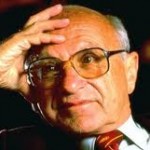My first look at this book (and its author, John Ralston Saul) was here, and the first and second chapters were summarized – in 500 words or fewer – here and here. Wow. I’ve been two months getting to this chapter since the last one. Sorry.
The middle lecture of the 1995 series of five Massey speeches was titled “From Corporatism to Democracy”. If you have read some John Ralston Saul, or even my previous summaries, you won’t be surprised at his opposing of these two currents of civilization. Indeed, much of The Unconscious Civilization dwells on the insistent, apparently inextinguishable rise of corporatism – the elite groupings that oversee the manipulation of capital – and its constant undermining of the democratic process and principles which Western nations allegedly hold dear. (I resisted using the word “zombie” in that last sentence. Decorum, and so on.) However, corporatist “self-interest” erodes the “disinterest” that broad expressions of conscious citizenship produce, which are aimed toward the general good. Saul defines such thoughtful, big-picture citizenship as the expression and the consequence of humane individualism, which he contrasts with bands

Milton Friedman, RIP. In 1995, Saul ridiculed his equation of democracy with capitalism, among other things. He is gone now, but his economic disciples remain strong.
of minority elites pursuing their corporate agendas.
As was done for the previous two lectures/chapters, here are 500 words that try to capture Saul’s argument:
- Individualism is not isolationism; we live in society, and “the most powerful force possessed by the individual citizen is her own government(s)”. This source of social legitimacy encourages citizenship; “gods, kings or groups” diminish it.
- Advocating reduced government for the sake of personal “freedom” puts “artificial limits on their only force”; the power vacuum will be filled by corporate interests and their bureaucracies.
- Hume’s assertion that people are “governed by interest” is misused by advocates of market forces to “suggest that the public good is a fiction”. Hume urged civic duty as a replacement for the superstitious rule of the Church, not to substitute the marketplace as a new deity.
- Democracy is independent from economic theories, and citizens (and governments) must not become corporate subjects.
- In the rise of humanism, “democracy and individualism have advanced in spite of and often against specific economic interest”, while anti-democratic corporatism is always aligned with economic power. Market theorists and demagogues like Mussolini share an “inability to see the human as anything more than interest-driven…[or] to imagine an actively organized pool of disinterest called the public good”.
